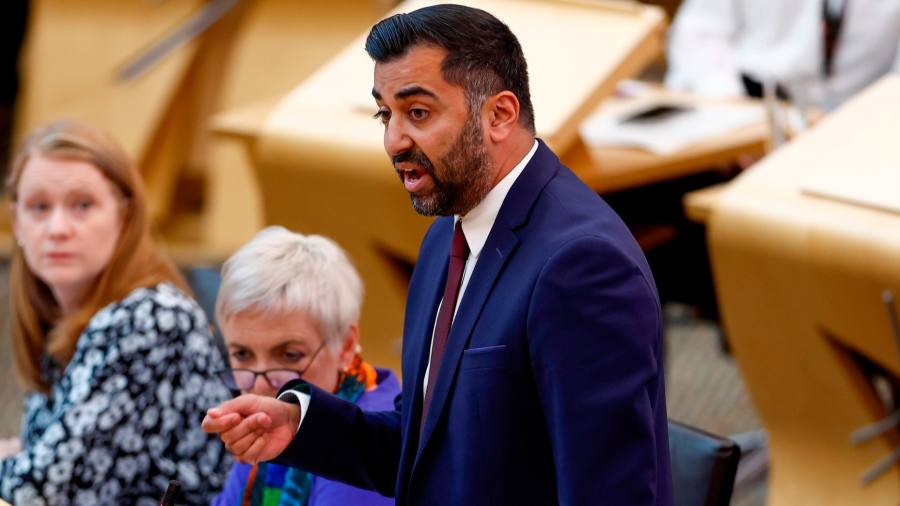
Receive free Scottish politics updates
We’ll send you a myFT Daily Digest email rounding up the latest Scottish politics news every morning.
Scotland’s first minister has sought to revive the fortunes of his crisis-hit, ruling Scottish National party with a legislative programme focused on a £1bn increase in welfare spending.
Unveiling the government’s annual programme on Tuesday, Humza Yousaf said he would increase the social security budget by “nearly” £1bn to almost £6.3bn in 2024-25.
He said this would include an extra £400mn in child welfare payments for low-income families, who can currently claim £25 per child per week.
Yousaf, whose six months in office have been dominated by a financing scandal that engulfed the SNP, said he would also remove income thresholds for a programme that helps pregnant women and families with children aged up to three years old to buy healthy food.
“The programme for government . . . is unashamedly anti-poverty and pro-growth, and it has a focus on supporting women who are disproportionately affected by the pressures of modern life, including through expanding our child care offer,” Yousaf said.
The first minister also announced a consultation on a possible ban on single-use vapes, in the latest regulatory clampdown on a product that has been blamed for entrenching nicotine use in young people.
Yousaf is facing a critical electoral test next month against a resurgent Labour party in a by-election in Rutherglen and Hamilton West outside Glasgow. The SNP has suffered in the opinion polls since the resignation of Yousaf’s predecessor Nicola Sturgeon in March and the ongoing police investigation around the party’s financing.
The SNP is seeking to outflank Labour on the left by highlighting its support for redistributive policies. In contrast, Labour leader Sir Keir Starmer has refused to commit to reversing Conservative policies such as the welfare cap on families with more than two children.
Scottish Labour leader Anas Sarwar said the government had “lost its way, has no clear direction, no sense of purpose and no central mission”. He added: “It is just another tired and rehashed programme from a party that has clearly run out of ideas.”
Scottish Conservatives leader Douglas Ross said Yousaf had failed to move on from the priorities set by Sturgeon. “It’s business as usual for this continuity government and continuity first minister. It’s also a programme that’s a lot of talk and very little action.”
In his speech, Yousaf reiterated his commitment to improving the SNP’s relationship with business but warned against worshipping the “false god of consensus”, as he committed his party to “long-term rent controls”.
Yousaf did not say how Scotland would finance its extra spending, given a weak economy and net deficit of 9 per cent of GDP in 2022-23.
The Scottish consultation on a potential vape ban came as data from the Office for National Statistics on Tuesday showed that daily or occasional e-cigarette use among 16- to 24-year-olds in Britain had jumped to 15.5 per cent last year, from 11.1 per cent in 2021.
Governments worldwide are increasingly clamping down on the products, whose wide variety of sweet flavours has been blamed for making vapes more attractive to young people. Under-18s cannot legally purchase vapes in the UK. Last week, France announced a ban on single-use vapes, while Germany has banned flavoured e-cigarettes, joining Australia and New Zealand, which have rolled out crackdowns on the products.
The UK government, which completed a consultation into reducing youth vaping earlier this year, is unlikely to impose an outright ban, according to people close to the process.